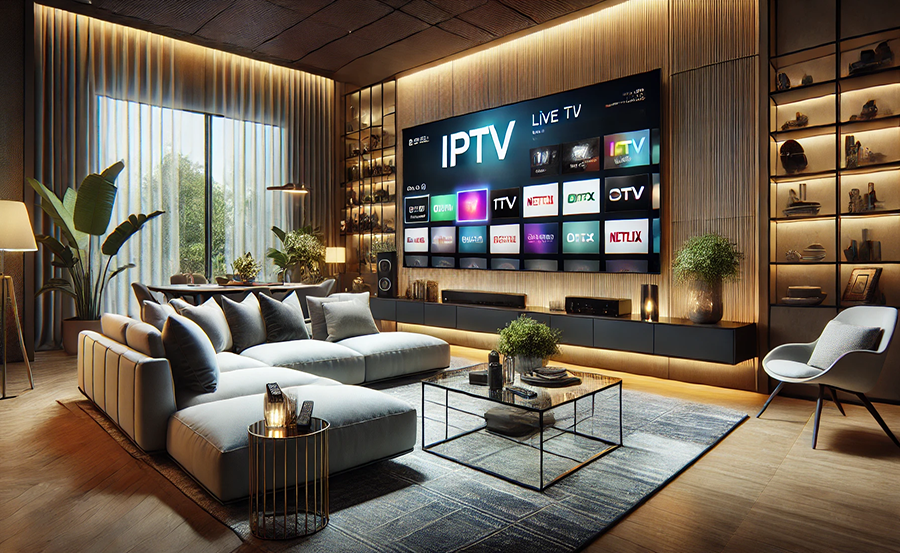In a world where entertainment seems to be constantly evolving, IPTV, or Internet Protocol Television, has emerged as a prominent player, reshaping the way we consume content. As traditional television faces declining viewership, IPTV stands out as a revolutionary technology paving the way for the future of TV. Offering flexibility, it brings a host of benefits that meet the demands of the modern viewer. But what exactly is IPTV, and why is it regarded as the future of television? Let’s dive in to uncover the answers.
Buy 1 Year IPTV Subscription and Enjoy Unlimited Content
What is IPTV?
At its core, IPTV is a digital television service delivered via the internet. Unlike conventional broadcast methods such as cable or satellite, IPTV uses internet protocol (IP) to provide television programs. This method allows viewers to stream content directly over their broadband connection, typically requiring only a set-top box or a compatible device.
IPTV’s key advantage lies in its ability to offer a personalized viewing experience. By leveraging the internet, IPTV services can provide tailor-made content packages. This customization is appealing to users who prefer specific channels or shows rather than traditional broad-service offerings.
Pro Tip:
Looking for the Best IPTV Provider? Access thousands of channels with Helix IPTV for premium entertainment.
How Does IPTV Work?
The technological infrastructure behind IPTV involves transmitting video content over the internet protocol framework. This can be broken down into three main components: content head-end, network, and end-user devices. The head-end acts as the control point, acquiring content, encoding it into IP-friendly formats, and finally distributing it over a network.
Users can access this content via end-user devices, such as smart TVs, tablets, or smartphones. The ease of use is amplified because of features like on-demand content, live TV, and interactive elements that are integrated into many IPTV systems.
The Types of IPTV Services
- Live Television: Streaming of current broadcasts in real-time.
- Video on Demand (VoD): Access a library of pre-recorded shows and movies.
- Time-Shifted TV: Catch-up services for missed television broadcasts.
The Advantages of IPTV
With IPTV, the advantages over traditional broadcasting methods are significant. Firstly, IPTV stands out due to its affordability. “Affordable IPTV” services are not only economical but also offer a diverse range of channels that cater to different interests.
Moreover, IPTV provides users with unprecedented convenience and control over their viewing schedule. By shifting away from TV schedules, users can watch content on their own terms. This freedom extends to the capability of pausing, rewinding live shows, or accessing content at any time.
Interactivity and Convenience
Unlike linear TV, IPTV offers interactive features that enhance the viewing experience. Viewers can participate in votes, quizzes, or even engage with multimedia content that adds layers to the standard viewing.
In addition, IPTV services integrate seamlessly with mobile devices. This compatibility means not being tethered to a living room TV. Being able to access “Best IPTV channels” from anywhere with an internet connection transforms travel time into prime viewing opportunities.
The Challenges Facing IPTV
Despite its many benefits, IPTV still faces several challenges. One of the primary issues is bandwidth. As IPTV is internet-dependent, a stable high-speed connection is necessary to enjoy uninterrupted streaming.
Security and piracy also remain concerns within the IPTV ecosystem. Ensuring encryption and proper digital rights management is crucial to protect content providers and ensuring a consistent revenue model.
Overcoming Technical Limitations
Emergence of 5G technology and improvements in network infrastructure are promising developments that can reduce latency and improve connection stability, further enhancing the IPTV experience.
Choosing an IPTV Service
Selecting an IPTV provider involves considering several factors. These include evaluating cost, content selection, reliability, and customer support. Do they offer the “Discover Superior IPTV Viewing” experience that you’re after? This is an essential question to ask.
Users should explore service reviews and trial periods to assess which provider aligns with their viewing preferences. Remember, the right balance of affordability and quality will define the best option for your entertainment needs.
Customization and User Satisfaction
Choosing a provider with customizable packages allows users to tailor their viewing, reducing cost and maximizing satisfaction. Such flexibility can significantly enhance the overall user experience.
The Future of IPTV
The rapid evolution of IPTV points toward a promising future for the television industry. As technology continues to advance, IPTV’s potential will likely expand into areas currently under development, like augmented reality and enhanced interactivity.
Industry experts predict that IPTV will eventually lead to the convergence of media types, further blurring lines between traditional TV, social media, and online content.
Adapting to New Trends
As this technology matures, staying updated with new trends and consumer behavior will be essential for content creators and providers to remain competitive. IPTV is not just a temporary phase; it’s a serious contender for the future of broadcasting.
The Role of Artificial Intelligence
AI and machine learning will play crucial roles in understanding individualized viewer patterns, enabling better content recommendations, and implementing personalized advertising strategies.
Concluding Thoughts
As IPTV continues to carve out its place in the entertainment landscape, its potential to revolutionize how we consume media remains clear. Offering a customizable, interactive, and affordable viewing experience, IPTV stands as a testament to the flexibility and possibilities of internet-based broadcasting.
Frequently Asked Questions (FAQ)

What is the primary advantage of IPTV over traditional TV services?
IPTV offers more flexibility and control over viewing schedules, often coming at a lower cost compared to traditional TV services. It allows for viewing on multiple devices, providing greater convenience and access to personalized content.
Can IPTV work on any internet connection?
While IPTV can work on various internet connections, it performs best with high-speed broadband. The quality of the experience can vary greatly depending on the speed and stability of your connection.
Is IPTV legal worldwide?
IPTV services are legal, but the legality of accessing content may vary depending on regional laws and licensing agreements. It’s important to seek legal IPTV providers that comply with local regulations.
How do I choose the right IPTV provider?
Consider factors like pricing, channel availability, device compatibility, trial offers, and customer reviews. Opt for a provider that aligns with your entertainment preferences and offers reliable customer support.
What challenges does IPTV face in maintaining service quality?
IPTV’s primary challenges include dependence on high-speed internet, security issues, and the need for robust technical infrastructure. Overcoming these challenges is vital for quality service delivery.
Advanced Troubleshooting for Persistent IPTV Connectivity Problems





